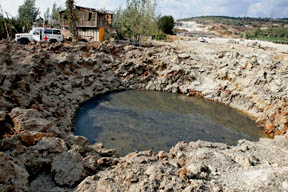|
observer |
|
|
|
|
|
OTHER LINKS |

|

|

|
No comment, no words, only immense sorrowBlogging in BeirutBlogs express the reality of living within the war zone of Lebanon in a way that few journalists can. Images of the Qana massacre in Lebanon are numbing. There can be no comment. No words. Only immense sorrow and anger at the pointless nature of war. Before our very eyes we are watching a nation being destroyed.
None of this is unfamiliar. It happened three years ago, in Iraq. But Lebanon is another story. A tragic one. It has a history that seems cyclical. The Israelis bombed Qana in 1996. Then, over 100 died. And then it was bombed again by them on Sunday, July 30, 2006 and more than 50 died, 34 of them children. It makes no sense because war makes no sense. We know that. Leaders of nations should know that. History should have taught the world that. And yet wars happen. Wars without end. The sea along Lebanon's coast is a blue we cannot imagine in this country. It is the blue of the Mediterranean. But today, 100 km of this beautiful coastline is covered in oil. It is killing all life forms; it is destroying a space that knew no sectarianism of the kind that has divided Lebanon for centuries. For one of the by-products of war is not just dead and wounded people but a countryside that is also left to die. The bombing of a power plant in southern Lebanon has released 15,000 tonnes of oil that has covered its beautiful beaches. As a result, the seaside city of Byblos Bay, considered "the oldest port city on Earth", will not celebrate its 7,000th birthday because it is enveloped in a "blanket of oil". For the real picture. You don't read that much about these other effects of war in the media as it concentrates on the main events, on the war, the casualties, the destruction. For information on this you have to turn to the 21st Century media, "blogsphere", that independent space on the Internet where ordinary people can write, express, have a say. Thus, in July, numerous blogs from Beirut have come up. Many of them are written by artists, by poets, by writers. They express the reality of living within the war zone in a way that few journalists, forced to write prosaic prose against tight deadlines, can. One of the most popular is by artist Zena el-Khalil (www.beirutupdate.blogspot.com), which she calls "War diaries of a 30-year-old woman... with love from Beirut". Zena had a mixed media show in Beirut as recently as May this year. Her images bear the imprint of the war that has been waged virtually without a pause in her country for decades. Zena's words come from her heart, and they probably echo what thousands of people in her city feel but have no way to express. She writes about the daily realities of living in a city under siege, posts pictures of the oil that is killing all natural life along the beaches, and expresses her revulsion at a state of affairs about which she had no choice. Here is one excerpt from her blog: I don't want to live a life of war. I did not ask for this. I do not want this. I had another life. One that was directed by me. One that I was in charge of. Decisions that I made by myself. Responsibilities that I set for myself. I don't want to be a war story. Do you understand what I am trying to say? I just want to be me. Live the life that I spent shaping and moulding for myself. Follow my dreams. Carry out my projects. Paint what I feel like painting, and not what is imposed on me. This war is imposed on me. Like all wars are, on all civilians. Anybody listening? It is worth taking the time to read what women like Zena, or Joumana, a 23-year-old graphic designer (www.hopefulbeirut.blogspot.com) have to say about life in bombed-out Beirut. Here is a quote from Joumana's blog: These days, it seems everyone is flying away, escaping our country. We seem content to become refugees and immigrants instead of citizens. Parents are frantically searching for visas, nationalities, anything that enables their families to leave. Why does our livelihood come at the expense of our lives? Shall we exit our identity and leave our country at the border? Shall it become just another hot spot on the Middle Eastern front? Just another headline? Why is travelling abroad becoming a necessity instead of a luxury? Rocket reports, international summits, humanitarian relief, threats and demands, everyone is talking but no one is listening. Please be silent. Please listen. If you will not help, at least don't hurt... our wounded heart wants none of your pity, or your condemnation, or your approval. Right now, we are focusing on surviving this inferno. Later on, we will ponder the possibilities made available and we will calculate the cost of our freedom. We will check the price of peace, and wonder if we gambled our future along the way. Then we will be silent and we will think. Some of us will be silent, we will think. But those who plan strategies of war, those who believe terror can be stemmed by terrorising an entire country, those who shrug off the killing of 34 innocent children as "a mistake" seem to find no need to pause, to be silent, to think. The fog of righteousness that envelops them cannot be penetrated by reason. But these "mistakes" will follow those who make them. Terror begets more terror. Surely we should know this by now. (The Hindu) |









